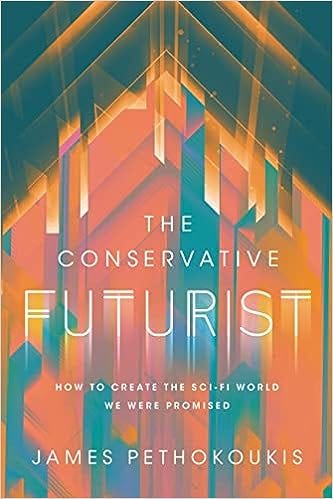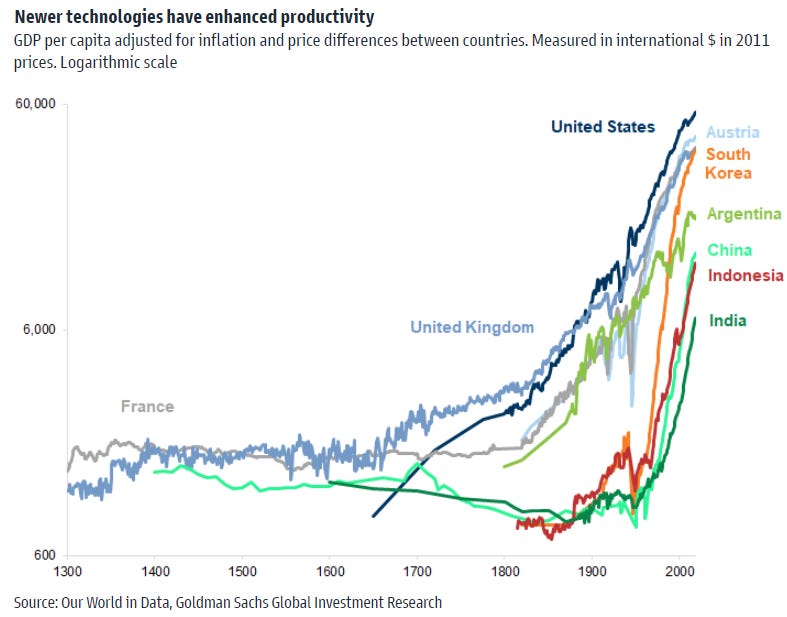🤖 The big questions about AI have nothing to do with killer machines
Determining the true economic importance of AI and its various societal impacts is a better use of our time and brainpower
Quote of the Issue
"AI is intrinsically good, because the effect of AI is to make people smarter." - Yann LeCun, chief AI scientist at Meta
Some self promotion: I have a book coming out on October 3. The Conservative Futurist: How To Create the Sci-Fi World We Were Promised is currently available for pre-order pretty much everywhere. I’m very excited about it! Let’s gooooo! 🆙↗⤴📈
The Essay
🤖 The big questions about AI have nothing to do with killer machines
My hope is that little of my future coverage of AI/machine learning/generative AI will concern the supposed risks it poses to humanity’s continued existence. You know, Terminator kinds of questions.
Instead, the big questions that I find interesting concern the true economic importance of AI and, assuming it is an economically important technology, the follow-on impact on society. It’s more those kinds of questions that Capital Economics, a consultancy, examines in a short recent note from economist Neil Shearing, “The five questions that will determine AI’s ultimate economic and market impact.”
The result is a helpful framing through which to examine new AI developments and studies as they emerge. So here goes (some of the charts are from CE, some from other sources obtained by me):
“Should the new breed of generative artificial intelligence be considered a general-purpose technology or GPT?” Whether machine learning (and deep learning and generative AI) qualifies as a GPT hinges on its potential for wide application and significant economy-wide impact. Like past GPTs such as steam power, electrification, the internal combustion engine, and computing, AI may profoundly transform multiple sectors. Yes, early days here, especially with GenAI, but I read the early evidence as suggesting its capabilities to generate realistic text, images, and audio might well result in big productivity boosts for writers, coders, customer service providers, and researchers across sectors.
From CE: “AI’s detractors, including economist Robert Gordon, argue that the technology isn’t impressive enough to meet the definition of a GPT and so won’t deliver economy-wide transformations as the printing press and railways did in their time. But we think AI does meet most of the agreed criteria to be considered a GPT and, if we’re right, then the economic and market implications are large and wide-ranging.”
“What is the plausible impact on productivity growth?” This may be my favorite topic these days. Again, early studies suggest GenAI, in particular, promises economy-wide productivity gains. As a new form of capital, AI can boost capital per worker, or capital intensity. But its bigger impact may stem from improving total factor productivity, or how efficiently labor and capital generate output. (TFP is economic shorthand for tech progress and innovation.)
From CE: “The key lesson from history is that GPTs have a transformative effect on [TFP] by facilitating better working practices. Electrification meant workers no longer had to be organized around a centralized power source, enabling more efficient production lines. AI will have similar transformative effects both in ways we can already envisage – such as contract writing or illustration and design – but also in ways that are impossible to yet see.”
Great point: If AI is as big an economic deal as I think it is going to be, the most productive uses and results have yet to be imagined and realized. This is especially the case if AI enables more efficient scientific research.
“What are the timeframes over which all of this will take effect?” Although new technologies require time to spread throughout the economy and get put to productivity-enhancing use, diffusion rates have accelerated over the course of the broad Industrial Revolution. Steam-powered trains took 75 years to become commonplace and electricity 50 years, Shearing notes, while desktop PCs became ubiquitous after only 20 years and mobile phones just 10. Adaptation lags persist but are shrinking as infrastructure and processes rapidly integrate innovations. AI's productivity benefits, though not immediate, may propagate faster than past GPTs given compressed adoption timeframes. CE: “Technological changes don’t happen overnight, and neither do the productivity benefits from them … but those adoption times are shortening.”
“Will AI create or destroy jobs?” By this time, you’ve probably seen various analyses looking at how GenAI will affect various job tasks — automating some, complementing some, and creating new ones. But rather than a bottom-up view of where and how AI automates job tasks, Shearing argues, AI analysis should consider its economy-wide effects: “The rise in productivity and real incomes caused by AI will boost aggregate demand and create new jobs in all sectors. What matters is the balance between the overall demand for and supply of labor.” History suggests as much, and I think the burden of proof is oe those arguing “this time is different.”
“How will AI diffuse within and between economies?” Shearing:
A key problem with most assessments of AI’s is the implicit assumption that all economies will be affected equally. In practice, the success with which economies adopt and adapt to new technologies varies enormously. The ICT revolution was a boon for the US in the 1990s, but left productivity growth in Germany and France broadly unchanged. (See Chart 2.) Attempts to rank economies according to their “AI potential” typically focus on their ability to innovate new technology. These exercises are incomplete, failing to take into account the ability of economies to diffuse that technology, and then to adapt to the opportunities and challenges presented, including to the disruptions that AI will inevitably cause.
Unfortunately, we’re going to have to wait for the firm's detailed answer about the AI potential of various countries until it releases its AI Economic Impact index later this month. I’m looking forward to reading it — especially how the firms sees the China and the US stack up against each other.
Micro Reads
▶ Google court trial on search dominance set to begin in US - Stefania Palma |
▶ Nvidia, Palantir and more companies join White House AI pledge - Cat Zakrzewski, WaPo
▶ Italian nuclear industry revival on the table - Michele Catanzaro, Nature |
▶ Can massive solar power expansion regenerate the US’s iconic prairies? - James Dineen, New Scientist |
▶ Robots that learn as they fail could unlock a new era of AI - Will Douglas Heaven, MIT Tech Review |
▶ SpaceX’s near monopoly on rocket launches is a ‘huge concern,’ Lazard banker warns - Michael Sheetz, CNBC |
▶ Webb Telescope Sees Tantalizing Molecular Signals on Possible Water World - Isaac Schultz, Gizmodo |
▶ A year after New Shepard’s accident, Blue Origin may return to flight next month - Eric Berger, Ars Technica |
▶ How to avoid a green-metals crunch - The Economist |
▶ A Huge Lithium Discovery That Economists Were Expecting - Tyler Cowen, Bloomberg Opinion |
▶ Can Singapore hold on to its reputation as Asia’s ‘safe haven’? - Mercedes Ruehl, FT |
▶ You hate AI for all the right reasons. Now reconsider. - Josh Tyrangiel, WaPo Opinion |
▶ Artificial Intelligence Can Make Companies Greener, but It Also Guzzles Energy - Nuha Dolby, WSJ |









No mention of energy of course. Or Jevon's paradox. Or how increasing complexity doesn't necessarily make life better.
Are you saying that solar panels covering the prairies will power all of this new electrical activity? And that AI will solve every other problem that we are currently enduring because they will help businesses lay off more workers?
Not the sure the AI equation is going to work out as some people think it is. Things will probably get real nasty before long and then all bets are off.
While you graphs may be germane, they are much too small to be readable in the emails.